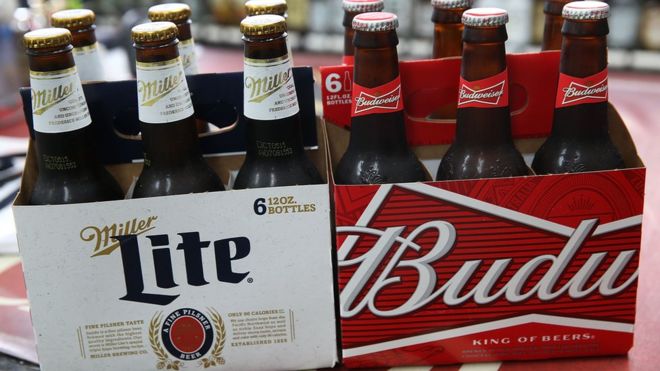The world’s two biggest beer producers are set to merge after SABMiller accepted an increased takeover offer from rival Anheuser-Busch InBev.
SABMiller said it had agreed “in principle” a £44-a-share offer, after four previous attempts from AB InBev.
AB InBev’s brands include Budweiser, Stella Artois and Corona, while SABMiller produces Peroni and Grolsch.
If the deal, worth about £70bn, goes ahead, the newly-created firm will make about 30% of the world’s beer.
SABMiller has a workforce of close to 70,000 people in more than 80 countries, and global annual sales of more than $26bn. AB InBev has a workforce of 155,000 and global revenues of more than $47bn.
Global market share of five biggest beer companies
Anheuser-Busch InBev – 20.8%
SABMiller – 9.7%
Heineken – 9.1%
Carlsberg – 6.1%
China Resources Enterprise – 6%
Source: Euromonitor, based on 2014 figures
AB InBev had made four previous bid approaches for SABMiller – at £38, £40, £42.15, and £43.50 per share – but they had been rejected by SABMiller, which argued they undervalued the company.
In a statement, the boards of the two firms said they had now “reached agreement in principle on the key terms of a possible recommended offer”.
The two companies have not yet formally finalised the terms of an offer, but the latest development means they have extended the City deadline for a firm offer until 28 October.
Analysis: Matthew Davies, business reporter, Johannesburg
SABMiller’s African brands are actually one of the main reasons AB InBev is so thirsty for this merger. Carlos Brito, the chief executive of AB InBev, has said that Africa is a “key piece” of the deal.
SABMiller, of course, has its roots in Africa – South African Breweries was founded around the time of gold rush in Johannesburg in the late 19th Century. As it stands, and if this deal goes through, it would mean that the merged entity would control 31% of global beer sales.
AB InBev’s brands are largely concentrated in the Americas and Europe; SABMIller has about 40 brands in Africa. It was the growth of SABMiller’s African brands that really attracted AB InBev.
What makes these brands so tasty is the growing African middle class, an army of consumers that all the major brewing companies have been eyeing up in recent years. As African beer drinkers have become more prosperous over the past 20 years, they have moved out of the informal home-brewing market and started to buy branded beer.
The latest proposal comes a day before the original deadline, by which AB InBev had to make a formal bid for SABMiller or walk away for six months.
The offer represents a premium of about 50% over and above SABMiller’s share price in mid-September, before the bid battle started.
In morning trade in London, SABMiller’s share price rose 9% to £39.48, while shares in AB InBev were 2.85% higher at €101.15 in trading in Brussels.
Source: BBC





























